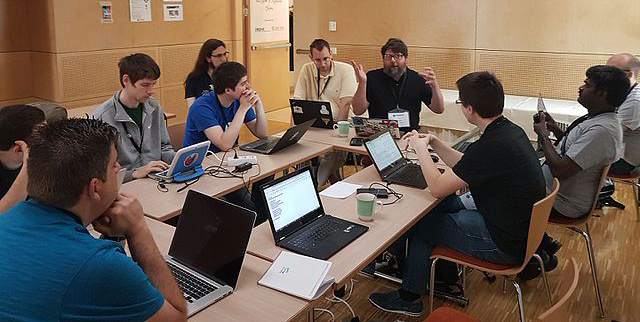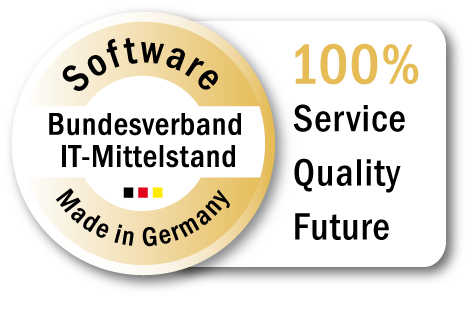A culture of knowledge exchange – Impressions of the Wikimedia Hackathon 2017
23. May 2017
Vienna! A city of music, culture and avant-garde. And host of this year’s Wikimedia-Hackathons, the annual tech event where around 200 developers, admins and users of MediaWiki came together to experiment and discuss with like-minded people. Of course, we were also there with BlueSpice – the enterprise version of MediaWiki. There was a lot of new things to discover, old acquaintances to maintain and exchange experiences and ideas.
LDAP and MediaWiki
An urgent topic that we put on the agenda was the current status of LDAP support for MediaWiki. The maintenance of the old LDAP authentication was stopped. About the same time MediaWiki changed its authentication model. While LDAP authentication has been updated to work in the most common scenarios, it no longer meets many requirements in the enterprise context. As a result, many initiatives were launched to restore LDAP support, resulting in a variety of ad-hoc solutions.

Wikimedia Hackathon – the central event of the MediaWiki Tech Community. Photo: Mglaser (CC BY-SA 4.0), via Wikimedia Commons
During the hackathon, our employee Robert took the opportunity to unify these efforts. In his meeting we agreed to work together on a system based on PluggableAuth (by Cindy Cicalese) in conjunction with Mark Hershberger’s PluggableSSO and some other extensions. This is the first step towards standardization and a good example of how collaboration between different external stakeholders can work.
A separate series of meetings
For the first time at a hackathon, the MediaWiki stakeholder group, of which BlueSpice is a member, had its own series of meetings: “Fantastic MediaWikis and how to maintain them”. We talked about use cases (ESA, Baugeschichte.at and the Vienna History Wiki), best practices and solutions (use with oregano, correct setup of runJobs, installation of VisualEditor, synchronization of several semantic MediaWikis), analytical findings (comparison to Confluence, results of a user survey) and discussed how to increase the acceptance of MediaWiki.
Among the many great things you can do with MediaWiki, there is the “vendor platform” WikiFab.org, which uses SMW to publish instructions for building beautiful things – a kind of open source repository for hardware. In the last two years WikiFab has developed a number of extensions that might be of interest for corporate users as well. BlueSpice and WikiFab are currently exploring the possibilities of collaboration.
In the further course of the event we offered a session on how to contribute to the further development of BlueSpice. Our software has many entry points for developers, such as the API, bug fixes in Gerrit and extensions based on the BlueSpice Foundation. In the session we discussed the wiki architecture and the mentioned possibilities. The feedback of the participants was very helpful, a comprehensive documentation will follow.
Worth a look are the prototypes and functions created by some Hackathon participants. Some of them we have put together on the showcase page. Among the projects are a collaborative real-time editor, a mood analysis of conversation pages, a trend topic page for Wikipedia, a game for categorizing images on Wikimedia Commons and – certainly not meant to be taken seriously – WikiReaper to keep you informed about remarkable deaths.
Markus Glaser and Richard Heigl, managing directors of Hallo Welt! GmbH, feel especially honored to have received a special mention for the organization of the “Fantastic MediaWikis” title during the opening ceremony. All in all, the Hackathon was very well organized and it was a pleasure to participate!
By the way, the credits for the title of this blog post go to Mark Hershberger.
Further links:
- Photos from the Hackathon 2017
- Tony Thomas: WMHACK 17 – what can possibly happen in 3 days
- T. Shrinivasan: Notes: Mediawiki Hackathon 2017 – Vienna, Austria Day 1, Day 2, Day 3.
- Gabriel Birke: Impressions from the Wikimedia Hackathon 2017 in Vienna
- Ziko: Viennese Diary
- WikiAhoi: Small souvenirs from Wikimedia Hackathon in VienneNiklas Laxström: Report on Wikimedia Hackathon 2017 in Vienna
- Rachel Farrand, Srishti Sethi, Claudia Garad, Sonja Fischbauer: What we learned by making both newcomers and experienced participants feel connected and engaged at the Vienna Hackathon
Share This Story, Choose Your Platform!
| Except where otherwise noted, news on this site is licensed under a Creative Commons Attribution 4.0 International license. |



